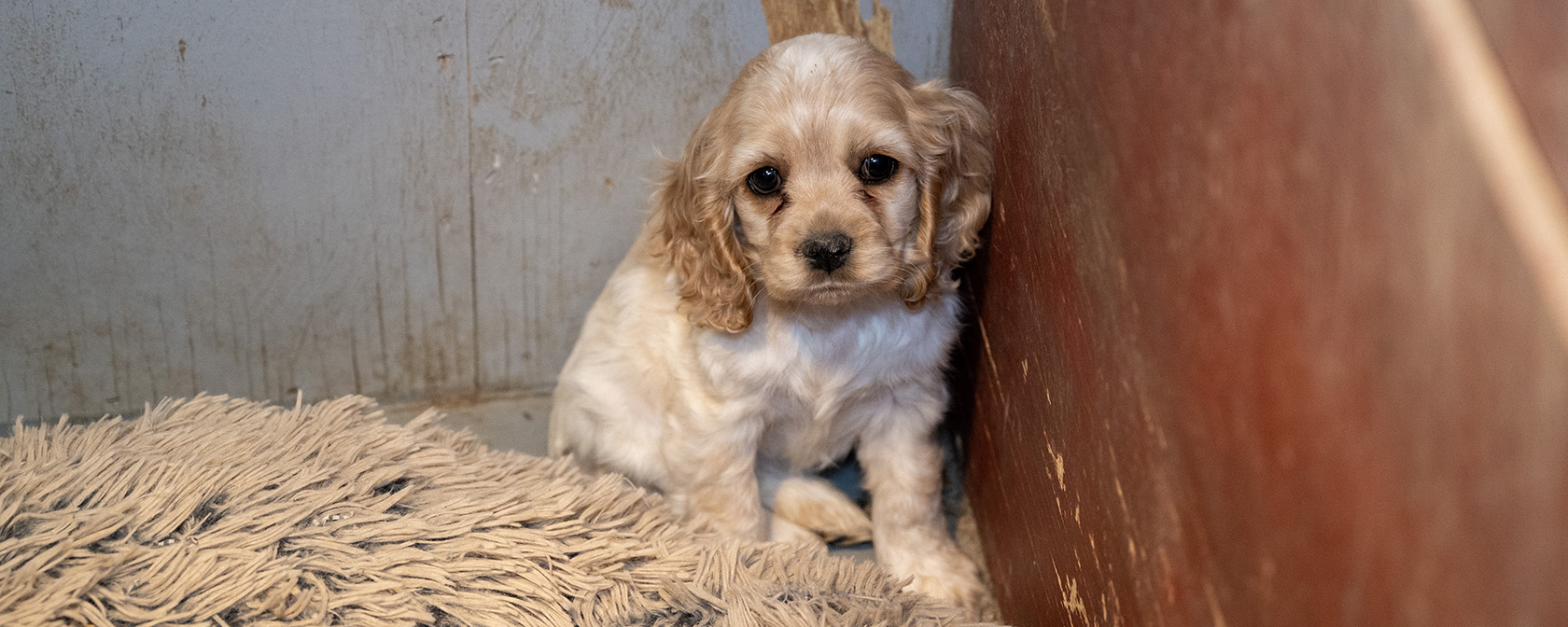By Sara Amundson and Kitty Block
The American Kennel Club turns 140 years old this week. Its tagline is “For the love of all things dog.” Nothing could be more misleading.
Although it tries to pass itself off in the U.S. Congress and elsewhere as an authority on animal welfare, the organization is a breed registry for purebred dogs, one that has actively come to resist progress for animal welfare. Over the last few decades, the AKC has become little more than a front for the puppy mill industry, one that serves the interests of large-scale mass breeders while charging them for the AKC’s certifications of pedigree and litter registrations. Despite its widespread name recognition as an animal organization, the AKC is not in the business of protecting dogs, as some elected officials and members of the public seem to believe. It’s in the business of protecting and supporting the interests of dog breeders and profits.
More than 20 breeders in our 2024 Horrible Hundred report, which details problem puppy mills across the U.S., have links to the AKC. One of these facilities was so infested with mice that some dogs could not eat their food without ingesting rodent feces.
When its government affairs arm weighs in on animal protection legislation, the AKC almost always positions itself as an opponent. Since 2008, we have been tracking the AKC’s record on such legislation. In the intervening years, the organization has sought to defeat humane measures more than 500 times in Congress and in state legislatures and local councils across the country. This is part of a deliberate strategy to mislead legislators and the public and block animal welfare reforms that enjoy wide bipartisan political support.
State bills the AKC has opposed in 2024 include: one in New York State to ban debarking of dogs; one in Michigan to hold individuals liable for damages if they kill service animals; and one in New Hampshire that would allow pet owners to collect damages if their pet is intentionally or neglectfully killed.
In recent years, the AKC has also opposed measures to ensure that dogs in breeding facilities have continuous access to water; to require owners to give their dogs access to adequate exercise space; to criminalize the possession, purchase or sale of animal fighting paraphernalia; and to prevent animal sexual abuse. This is all in addition to the many state bills and local ordinances around the country that the AKC opposes that aim to stop the sale of puppy mill puppies in pet stores. It’s pretty clear that dog welfare is not on the minds of the lobbyists executing this agenda.
One of the main reasons it fights reform is that the AKC draws much of its funding (its income was more than $103 million in 2022) from an astonishing number of dog registrations. A lot of that income is from big players in the puppy mill industry and their pet store sales outlets, including Petland, and that fact shapes the AKC’s legislative goals. The puppy millers prefer a weak federal Animal Welfare Act and even weaker enforcement of animal welfare regulations from federal inspectors.
This week, AKC representatives are out in force on Capitol Hill, actively fighting stronger animal protections and enforcement that would stem from the passage of the Better Collaboration, Accountability, and Regulatory Enforcement (CARE) for Animals Act and the Puppy Protection Act. The AKC misrepresents the former as doing “nothing to improve the wellbeing of dogs” and merely creating “confusion.” In fact, both bills are well-written and well-justified based on the record of the U.S. Department of Agriculture’s enforcement of the Animal Welfare Act, and the violations that the USDA and other parties have documented time and again at puppy mill facilities. They are also consistent with the demands of many concerned congressional representatives over the last few years; many have called for better enforcement and more collaboration between federal agencies in debates over the last few appropriations bills. No one who takes an honest look at things would dispute the necessity for further reform; the Better CARE for Animals Act already has 205 co-sponsors in the House and 32 in the Senate, and the Puppy Protection Act has 234 co-sponsors in the House.
The Better CARE for Animals Act would strengthen the U.S. Department of Justice’s ability to collaborate on Animal Welfare Act enforcement with the USDA. In high-profile cases, the DOJ has demonstrated the value of its close coordination with the USDA in relation to serious Animal Welfare Act violations. We have every reason to think that the additional enforcement remedies provided in this bill could do a world of good. These include those relating to license revocation, civil penalties and a process for pursuing appropriate seizure or forfeiture in cases where animals are suffering.
The Puppy Protection Act has a straightforward purpose: to improve the quality of life for dogs in federally licensed commercial breeding facilities, requiring stronger standards of care including increased enclosure sizes, prompt veterinary care and protection from extreme temperatures.
The reason for AKC’s opposition to these bills is crystal-clear. One bill would hold puppy mill violators accountable and the other would strengthen dog care standards at USDA-licensed mass-breeding operations. The financial interest of puppy mill operators dominates the AKC’s policy-making apparatus, and these bills could threaten profits if they lead to some of the worst actors being penalized or shut down.
What unites these two bills is the basic intention to strengthen the hand of government authorities to go after the worst puppy mill offenders, whose cruelty has been documented. Surely, if the AKC cared about dogs, it would “for the love of all things dogs” support that goal.
Urge your lawmakers to support the Better CARE for Animals Act and the Puppy Protection Act.
Kitty Block is CEO of the Humane Society of the United States.




